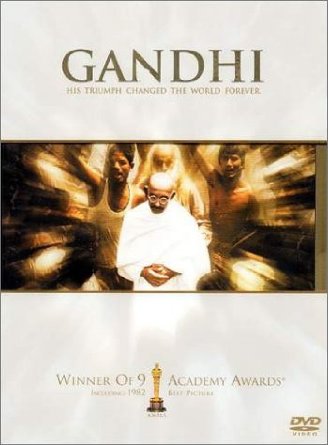Watching Attenborough’s Gandhi with my kid – Part 1
“Why can’t God make another Gandhiji? It will be good for our country”
“Why don’t you try to become like Gandhiji?”
To the second question from my 5 year old daughter I meekly reply, ”But then the police may beat me up, just the way they beat Gandhiji, and then what will I do?”
“Be brave Papa… be brave!”
This conversation was the result of watching Richard Attenborough’s Gandhi several times with my daughter, (I believe, nearly 10 times), as I lay in bed with a bad backache. I was trying to wriggle out of watching Cartoon Network, which was my fate as I was the baby sitter, not the easiest job to do bedridden.
At first it was just an experiment -subjecting a 5 year old to a film like Gandhi with mature themes may not be the wisest thing to do, but when I recalled the age at which I might have seen it, I gave it a go. To my utter surprise the film held her attention completely and her attention span is nothing to write home about, except when in front of a glowing rectangle showing animated content.
Much has been written about the power of film to influence and sometimes damage impressionistic young minds, which I was acutely aware of. We watched the film on totally different planes – for her it was more about grappling with the basic concepts of what is a country, what is the meaning of violence and what did Gandhi mean when he said, “An eye for an eye makes the whole world blind”.
For me it was immersing myself in one of the greatest, and sadly forgotten films ever made. The irony of the films ignominious fate after sweeping the Oscars is the same as that of Gandhi the man himself- after capturing an entire generation’s attention fully, being ignored in favour of new ideas that are easier to digest in today’s here and now Twitter world.
I remember watching the film when it was released along with my extended joint family of about 20 heads at about the same age as my daughter. I vividly recall the assassination scene, an event which I recently heard a news anchor refer to as “murder”(as opposed to the appropriate word “assassination”) and how Attenborough used it again at the end to great effect. It is the only film we saw as an extended family- it must have been a terribly important film for Indians, partly due to the sheer novelty of it having been made by a foreigner and British man at that. Since then we still haven’t been able to make a decent political film, for example a film about India’s most controversial Prime Minister India Gandhi cries out to be made, but that’s another story.
Thereafter the film became an independence day ritual on Doordarshan and I always watched spellbound. This must have continued for 10 years and then I lost touch. I acquired a DVD copy many years later but only lent it around to my friends from abroad and noted with pride their sense of wonder and awe at the story of India’s independence.
So what makes Gandhi such a great film? Consider for example a scene at the end of the film where Gandhi, incarcerated in a former palace converted into a makeshift prison, is sitting in the garden and spinning cotton. Margaret Bourke White the celebrated Life magazine photographer, played by the stunningly beautiful Candice Bergen, watches with growing exasperation. She tries her hand at spinning and failing to produce a centimetre of thread, exclaims in frustration, “I fail to see this (spinning cotton) as a solution to the world’s problems”. She is referring of course, to the scourge of WW2 which the world is facing and the matter of India’s independence appears trivial in comparison. She asks Gandhi a pointed question about Hitler and if nonviolence will work on him. Gandhi replies, “Not without defeats and sacrifices, but are there no sacrifices and defeats in this war?” His reply is in two parts - his shrug which implies his admission that he has not fully though through this, and his words which convey his absolute belief in a philosophy that he has spent a lifetime testing and fine tuning (he called his autobiography simply “My Experiments with Truth”). Note also his deft handling of media in those early days to his advantage, told as a side story about his enduring friendship with a NY Times reporter. Ben Kinsley speaks of one scene with Martin Sheen filmed in Gujarat against the backdrop of a setting sun on the Arabian Sea where Gandhi and Charlie discuss the Dandi March which he is about to embark upon, as a moment which he cherishes and which became a sublime piece of cinema.
...to be continued